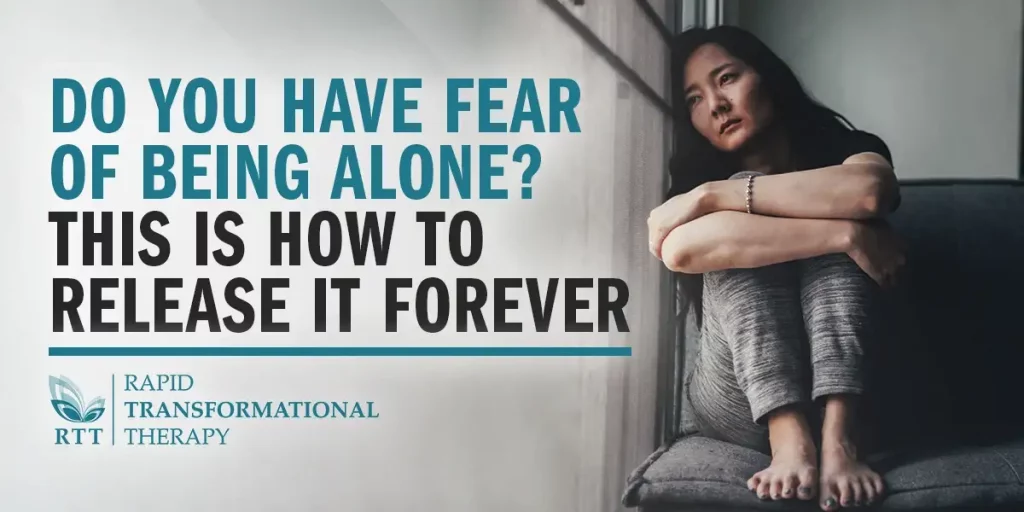Today, with social distancing becoming a norm, experiencing a fear of being alone is gradually becoming more and more commonplace. Do you feel a rush of anxiety, or a sense of dread when you are facing spending time on your own, away from your friends and family? Do you find yourself craving the presence of others and can’t bear to be on your own for very long?
This fear becomes especially visible if you, like many others, had to abruptly shift your social lifestyle. Many people with a phobia of being alone think that as long as they are with someone, they will be fine. In reality, however, when the fear goes by unnoticed for a long time, it can begin to negatively impact your relationship with others. It could even impact the relationship you have with yourself.
To break free from fear of being alone, you must first understand it. You must understand what it is, where it comes from, and how it affects your life.
In this article, you will learn:
- The definition and symptoms of fear of being alone
- The origin of the fear
- How the fear affects your relationship decisions
- Three simple and practical ways to let go of monophobia
Let’s get started with an explanation of the fear of being alone.
What Is the Fear of Being Alone?
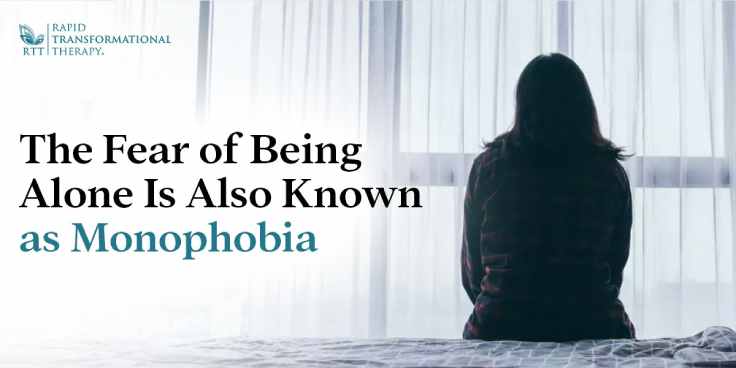
Not to be mistaken as feeling lonely, “fear of being alone” is feeling scared of being ignored or unloved by others. Feeling “lonely,” on the other hand, is being sad when you are without the company of others.
“Fear of being alone” is also called monophobia, autophobia, isolophobia, and eremophobia.
People with a fear or phobia of being alone often look and feel great when they are around others. However, as soon as they are by themselves, they feel intense feelings of anxiety, fear, and boredom.
It is totally normal if this happens a few times in life. However, if you notice a pattern of panic, fear, or deep anxiety every time you are alone, then you are probably experiencing symptoms of monophobia.
If you are wondering if you have monophobia, there are signs to look out for that can help you spot it early on.
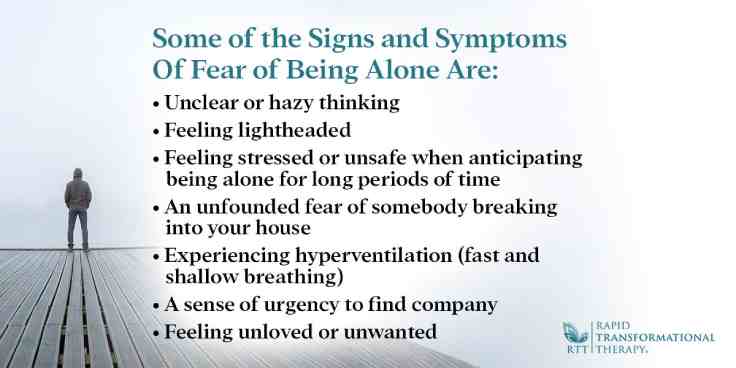
Can you relate your experiences with any of these symptoms?
Even if you said “Yes” to every symptom, having fear or phobia of being alone is not all doom and gloom. The good news is that there are simple and practical ways to manage and release this fear.
Firstly, it is important to get a better understanding of where it comes from.
Where Does Monophobia Come From?
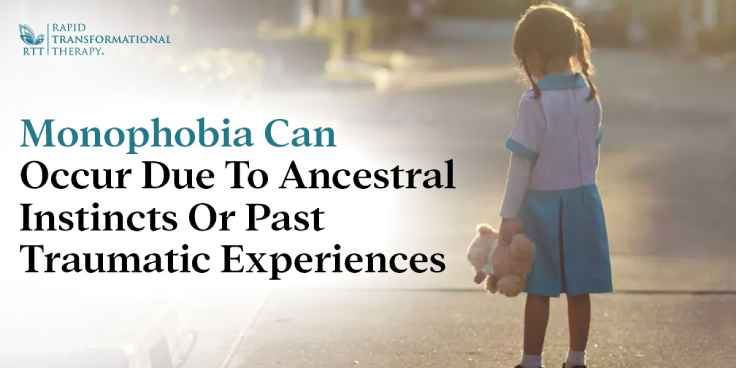
Monophobia can occur due to a variety of reasons.
One of the causes of monophobia is related to our ancestral instincts to survive.
Another reason for monophobia is our past traumatic experiences that could negatively impact the way we perceive ourselves and the world around us.
Let’s shed some more light and explain how these two points can lead to monophobia.
Our ancestral social instincts
Have you ever thought to yourself, “Why do I feel so alone?” and feel dreadful waking up to a Sunday without any plans with people?
One of the reasons you feel scared to be lonely is because humans are social creatures by nature.
Our ancestors have survived rough climates and dangerous predators through the power of community. Thus making us who we are today.
Evolutionary speaking, the instinct to stay in a group was developed and honed to keep us alive and healthy.
The ones who can attest to this are people required to live in isolated environments for months at a time. For instance, researchers stationed in Antarctica and even adventurers who spent months or years isolated from civilization have reported that being alone was the most difficult part of the job.
According to the research, being alone for too long can be damaging to both our mental and physical health. “Cardiovascular, inflammatory, hormonal, sleep-related, and emotional factors are all relevant.”
Our past experiences
Marisa Peer, a world-renowned therapist with over three decades of experience, has helped thousands of people, including CEOs, rock stars, and Olympic athletes, to release their fears and phobias.
Based on her experience and observation, fears and phobias are often acquired after traumatic experiences in the past. All of our fears are rooted in the belief that the situation, an object, or subject of our fear can cause us harm or even kill us.
To illustrate this point, let’s take a look at how one of Marisa’s clients developed a cat phobia.
A client—let’s call her Sara—came to Marisa’s office with a phobia of cats.
She was terrified of cats, “I’m supposed to go to Morocco soon, but I heard stray cats were everywhere, so I can’t go. When I go to someone’s house, I have to check if they have a cat. This phobia is seriously affecting my daily life.”—she said to Marisa.
During a therapy session with Marisa, Sara regressed back to a time and place when she was a little girl. Having a father who was scared of cats, she recalled him screaming the words, “The cat is going to kill you!” when a cat had jumped into her stroller.
That incident later formed a belief in Sara that cats are horrifying and they kill people—which was the root cause of her phobia.
Like in Sara, our past experiences can become a foundation of the fears and phobias we have today.
The Psychological Price of Fear of Being Alone
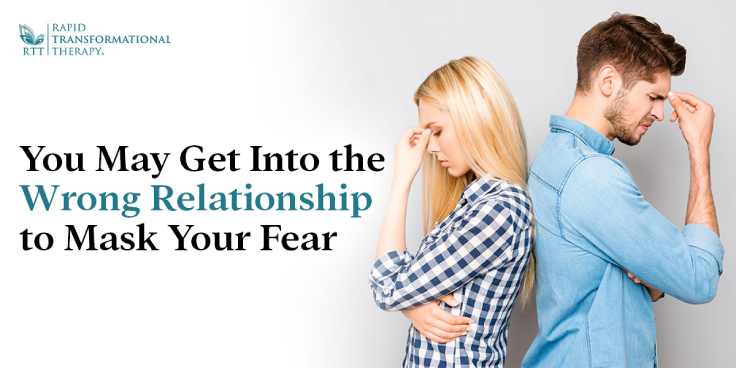
Perhaps one of the highest prices you pay for fear of being alone is spending the rest of your life with the wrong person.
In some cases, you can feel immense pressure from peers who are in happy relationships.
Peer pressure can make you feel worse about yourself and gradually develop a belief that you are unwanted and unloved.
Eventually, you can end up being in a wrong relationship just to mask the phobia of being alone and feelings of being unloved or unwanted.
Even after obtaining the relationship you yearned for, being with someone who is not right for you might be worse than being alone.
Well, how do you know if fear of being alone is controlling your relationship decisions?
Here are three signs of staying in a relationship because you are scared to be lonely:
- You justify things even though you are unhappy. Including convincing yourself to stay in a relationship because you have invested so much in it.
- You forgive the unacceptable. You accept being treated far below the standards you deserve. If your partner cheated on you or mistreated you, you comfort yourself by saying, “It’s okay,” or “Nobody’s perfect.”
- You want to repair an already broken relationship. You do not want to close the chapter with your ex because you cannot face being single again.
Now that you may have realized that the phobia of being alone may have been driving a lot of your relationship decisions, let’s explore ways on how to let it go.
How To Let Go of Monophobia
Letting go of monophobia does not need to feel challenging. By changing the little things in your lifestyle and thought patterns, you can begin to gradually release the fear.
The following are three simple and practical tips you can use to start your self-healing journey of letting go of the fear of being alone.
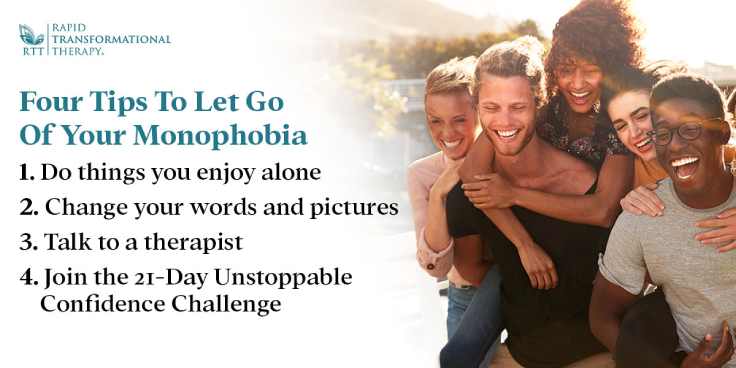
1. Do things you enjoy alone
Having someone to do things with you can be fun, but that does not mean you cannot have fun doing things alone.
Doing things alone empowers you to be confident in yourself and be independent.
So, do activities you used to enjoy doing with others and try doing them on your own. You can also find brand new activities to try out by yourself too.
Start with little things like going to restaurants or malls by yourself. Then move on to other activities like relaxing on the beach, reading a book on a Sunday afternoon, and visiting local attractions in your city.
While these activities might seem uncomfortable at first, they push you past your fears of venturing into the unknown, alone. After a while, you will feel more comfortable being in your own company.
2. Change your words and pictures
The words you say and pictures you imagine influence how you feel.
If being alone conjures up images such as being assaulted or makes you think of words like “You are unloved, unwanted, or unworthy,” then it is understandable why you might feel scared of being by yourself.
However, if you change the words and pictures in your mind, how you feel about being alone will change as well.
Start by telling yourself that you are safe, lovable, and worthy, even if you are alone. Write these words on mirrors or sticky notes and stick them on visible places such as your working desk or the pantry. Create reminders on your phone to remember to repeat these words to yourself.
These empowering words can make you feel safe and comfortable being alone, gradually dissolving the fear altogether.
3. Talk to a therapist
When monophobia becomes prominent and uncontrollable, it is recommended to talk to an experienced therapist.
Therapy is great at helping you release most phobias by working with the root cause directly using a multitude of methods.
Some therapy methods known for helping overcome fears and phobias are:
Exposure therapy
This therapy focuses on changing the way you respond to your phobia by gradually exposing you to it in stages. For example, your therapy may progress from thinking about being alone, to looking at pictures of a lonely person, to eventually experimenting with being alone for a short period of time.
Hypnotherapy
Hypnotherapy uses guided relaxation and intense concentration to help you achieve a heightened state of awareness. In this state, your mind chatter is bypassed, allowing your subconscious mind to become receptive to suggestions.
A hypnotherapist helps you access painful thoughts, emotions, and memories from the past that might be causing your fear, and rewrite disempowering stories with empowering ones.
Cognitive behavioral therapy (CBT)
CBT is a type of psychotherapeutic treatment that helps people to be aware of and change disempowering thought patterns that have a negative impact on their behaviors and emotions.
It emphasizes replacing automatic negative thoughts with a more realistic, empowering thought. Journaling, role-playing, and relaxation techniques are some examples of practices in CBT.
4. Join the 21-Day Unstoppable Confidence Challenge
If you think you suffer from monophobia, there is a good chance that means you also suffer from low self-esteem and confidence. Confidence is not just about facing heights or standing up to give a presentation to an audience – it is also about how you feel on a daily basis about both yourself and your relationship with the world around you.
If you find it difficult to imagine facing the world alone, you can improve this by focusing on rebuilding your confidence from the ground-up, so that you become satisfied with yourself and therefore the way you interpret your relationship with external factors will change. With unshakeable confidence, you can take things as they come and leave your fear truly in the past.
You might be thinking, that sounds great but how do I go about doing that?
Introducing Marisa Peer’s 21-Day Unstoppable Confidence Challenge.
Work with a group of like-minded people, who are also trying to rebuild their confidence, and with set tasks, challenges, and discussions over the 21-day period, you will learn things about yourself you never knew, and develop the kind of confidence it takes to tackle the world, and leave your monophobia behind.
Interested? Click the banner below to read more about the challenge.

Let Go of Your Fear of Being Alone—A Word From Marisa Peer
All of us deserve to live an uncompromised life. A life in which we are in happy, fulfilling relationships with others and with ourselves.
The good news is that your life does not have to be dictated by fear of being alone. You deserve a fulfilling life, and you already have the power to let the fear go. That power lies in your mind.
Your mind has the most powerful healing potential on the planet. Using the right methods, you can release the fear the same way you acquired it in the first place.
Rapid Transformational Therapy® (RTT®) is a complete therapy method using the power of your mind to easily let go of any fears and phobias, even if they have been with you since childhood.

With RTT® you will be able to tap directly into the root cause of the fear and release it using a combination of hypnotherapy, psychotherapy, Neuro-Linguistic Programming, cognitive behavioral therapy, and neuroscience.
An RTT® certified therapist can help guide you to go deep into your subconscious mind. They will uncover the root cause of your fears and the stories you have created around them. Working with your subconscious mind, you will be able to deeply instill new empowering stories, words, and pictures.
Book a call with a certified RTT® therapist today and welcome a life where you are perfectly comfortable being with yourself.
Alternatively, have a look at Marisa Peer’s Confidence and Self-Esteem self-hypnosis audio, available in the shop now. This best-selling audio is renowned for producing noticeable, rapid results, so you can stand tall and embrace life exactly how you deserve to.
